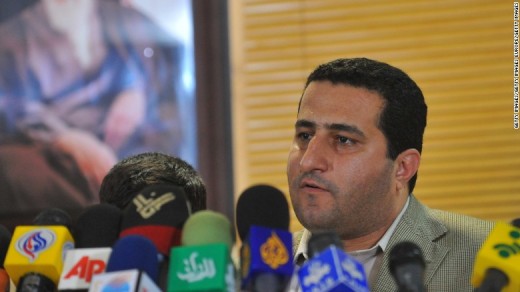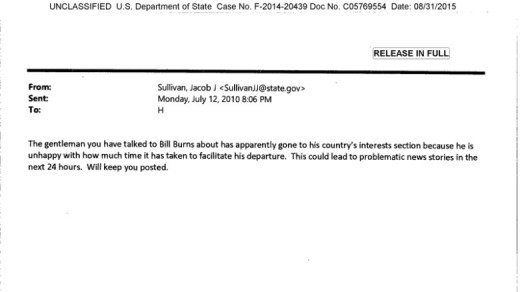Hillary's Unsecured Email Revealed Iranian Agent, Later Executed for Treason in Iran

In a direct link between then-Secretary of State Hillary Clinton's unsecured emails and an Iranian nuclear scientist who was executed recently as a spy, leaked documents shows references to the scientist in emails between Clinton and her staff. In one of the emails published by Wikileaks, Richard Morningstar, Acting Special Envoy of the U.S. Secretary for Eurasian Energy, wrote to Clinton, just before the scientist returned to Iran:
"Per the subject we discussed, we have a diplomatic, 'psychological' issue, not a legal issue. Our friend has to be given a way out. We should recognize his concerns and frame it in terms of a misunderstanding with no malevolent intent and that we will make sure there is no recurrence. Our person won't be able to do anything anyway. If he has to leave, so be it."
The scientist, who had claimed he was kidnapped by the CIA years before when he disappeared from a pilgrimage in Saudi Arabia, was the subject of a diplomatic quarrel in which the US maintained that the nuclear scientist, Shahram Amiri, had not been kidnapped but defected voluntarily. Iran claimed that he was kidnapped. Amiri likely did not know that references to him were being made in top State Department emails which very likely were being intercepted by Iran.

Last February the Director of the CIA and former NSA Director, Air Force general Michael Hayden, said:
"I would lose all respect for a whole bunch of foreign intelligence agencies if they weren't sitting back, paging through the emails,"
Hayden further opined:
"How much energy would I expend if I were still director of the National Security Agency and someone told me I could get access to the unclassified email server of [Russian Foreign Minister] Sergei Lavrov? I'd move heaven and Earth to do that. And here you've got these private, intimate conversations by a senior official of the U.S. government sitting out there in what I would call an unprotected environment."
Yesterday, Sunday August 7th, the UK Guardian reported:
"An Iranian nuclear scientist, whose disappearance in Saudi Arabia in 2009 and subsequent return to Tehran a year later from Washington was shrouded in mystery, has been executed in his home country.
The family of Shahram Amiri, an expert in radioactive isotopes at Tehran’s Malek Ashtar University, which is affiliated to Iran’s ministry of defence, told two overseas Persian-language TV networks at the weekend that he had been executed earlier in the week at an unknown location. The spokesman for the Iranian judiciary confirmed on Sunday that Amiri had been hanged, claiming he had given away state secrets."
The Clinton campaign has long held that Clinton's use of an unsecured server while Secretary of State never harmed US security interests. US negotiations with Iran over its nuclear program are dependent on the quality of the information negotiators have about Iran's capabilities and intentions. The best information of this nature is almost always obtained from people familiar with various aspects of the program. A CIA website description of this kind of intelligence, called HUMINT in the business for "Human Intelligence," explains under the subtitle "Importance of HUMINT":
"Human intelligence plays a critical role in developing and implementing U.S. foreign and national security policy and in protecting U.S. interests."
Intelligence leaks which undermine deep cover US operatives, experts maintain, makes it difficult for potential spies for the US to trust that their lives are safe in US hands.






